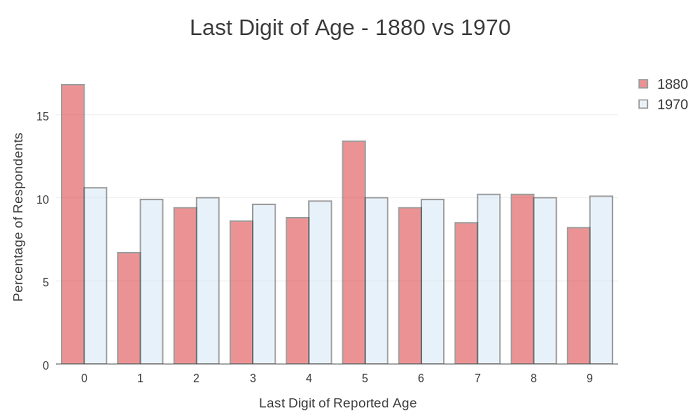The Last Digit of Your Age
Here’s a fun little data set from a statistics textbook I’m reading.
 These are the distributions of last digits of ages reported on the 1880 and 1970 US Censuses. At least two interesting questions come to mind, one with a seemingly easy answer.
These are the distributions of last digits of ages reported on the 1880 and 1970 US Censuses. At least two interesting questions come to mind, one with a seemingly easy answer.
I used Plot.ly to create this simple bar graph, which I shared here.
10 Comments
Sendhil Revuluri · July 1, 2014 at 1:24 pm
This is nice! You should submit it to http://www.101qs.com/…
Humberto Bortolossi · July 2, 2014 at 8:40 am
Hi! I’m curious: what is the name of the book you are reading? Thanks!
MrHonner · July 2, 2014 at 1:35 pm
Statistics, by David Freedman, et al
http://books.wwnorton.com/books/Statistics/
Curmudgeon · July 2, 2014 at 11:40 am
The effect is even more pronounced when you ask people the ages of their children and more pronounced still when asking about the ages of parents.
Julian · July 2, 2014 at 11:57 am
I don’t get it???
Curmudgeon · July 3, 2014 at 8:29 am
The tendency is to round ages. “How old is your mother?” can bring the exact age, but very often you get 85, or 80, with the respondent rounding to the nearest 5 years either because they aren’t sure or because it’s easier. Also, few people past 21 really care about their true age and tend to round as well “Oh, I’m thirty.” (…. and I have been for 3 years.)
Most mothers have their kids’ ages to the minute, but the older the kid gets the more likely the parents are going to be off by a couple of years, and again round it to the nearest five.
The 1880 data shows how environment and culture can affect your data collection. It was considered impolite to ask for age, so many people rounded and gave an approximate number … even though this was the Census. To add to the confusion, poverty, sickness and immigration. Poverty and sickness because if your parents were dead, you might not know or have been told when you were born, so you know approximately but you round it off when reporting it. You might have felt that you were too old (or young), so you changed the date (and your name and maybe your professed religion, too) when you immigrated.
By contrast, current practice has your DOB written down in many, many places … all of which can be mined for error-checking.
I would expect that Social Security and other modern programs play a role as well, in that certain ages get certain benefits so it is in the individual’s best interest to know it exactly.
Julian · July 3, 2014 at 10:32 am
I see. Thanks, Curmudgeon.
MrHonner · July 2, 2014 at 1:36 pm
Interesting. Makes sense–thanks for chiming in.
Brian · July 4, 2014 at 5:16 pm
Thanks for sharing. This is a great teaching tool.
Bonnie · July 7, 2014 at 10:03 pm
If you were born on 07/07/07 you would have turned 7 today, on 07/07/14. I can’t believe you didn’t comment about that!!!